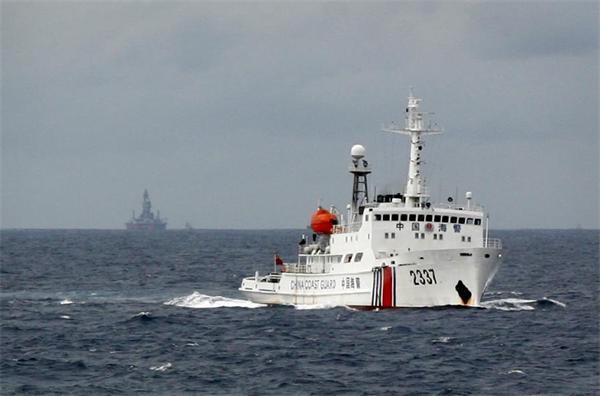 |
|
A Chinese Coast Guard vessel (R) passes near the Chinese oil rig, Haiyang Shi You 981 (L) in the South China Sea. [Photo/Agencies] |
US politicians who express serious concerns over China's construction work in the South China Sea and order their military planes to fly and their vessels to sail close to China's islets and reefs might be overwhelmed by the thought that Beijing is out to challenge Washington's dominant position in the world.
The safety and freedom of navigation in the South China Sea is an excuse for the United States to interfere in the region's affairs - it doesn't hold water because China hasn't done anything to thwart it. And China has stressed time and again that its reclamation work in the South China Sea will facilitate, not jeopardize, navigation.
In the South China Sea issue, the US has committed at least three errors. First, as a third party, it has no right to tell China what to do in its own territorial waters. The US is the sole superpower and still has the strongest military and largest economy in the world, but it should not ignore the great changes that have swept across the world since the end of the Cold War. The world has been become increasingly multi-polarized and the US is no longer in a position to dictate terms to big countries such as China and Russia and even some European states.
Second, the US' attempts to find an excuse to interfere in the South China Sea issue can only be described as clumsy. It has repeatedly accused China of escalating tensions in the waters by carrying out reclamation and construction works. But the fact is, by taking sides in the disputes it has emboldened the Philippines and Vietnam to provoke China. And by sending its military planes and vessels on reconnaissance missions close to China's construction sites, it could spark a military conflict.
Chinese leaders and senior officials have been saying that Beijing will try its best to settle the South China Sea disputes through peaceful means. So, if the US really wants to see peace and stability in the region, it should play the role of an impartial broker and should not hesitate to support China's stance of settling the disputes through peaceful means. But unfortunately, whatever the US has done until now contradicts the claims it has made.
Third, by trying to fish in the troubled waters of the South China Sea, US politicians are turning a blind eye to the reality of China-US ties and the "new type of major power relationship" that President Xi Jinping and US President Barack Obama have agreed to. China and the US are interdependent in many ways and their bilateral relations are important not just for them but also the rest of the world.
The hawks in US military and political circles think they can challenge China's core interests in the South China Sea by sending their military planes and ships, but they will only end up jeopardizing bilateral relations.
Xi has been reiterating that the Pacific Ocean is big enough to accommodate China and the US both. He told US Secretary of State John Kerry that both countries should value the achievements of bilateral relations and ably manage their differences.
But some US politicians' lack of respect for China's core interests and the not-so-able management of the differences could make the world's most important bilateral relationship shaky, which, in turn, could add uncertainty to the overall global situation.
Ably managing China-US differences is an important and serious job for politicians in both countries, especially those in the US. And while doing so, they have to see beyond the differences and keep the bigger picture of bilateral relations in mind - that it is vital not only for China and the US but also for maintaining peace and development across the world.
The author is a senior writer with China Daily.